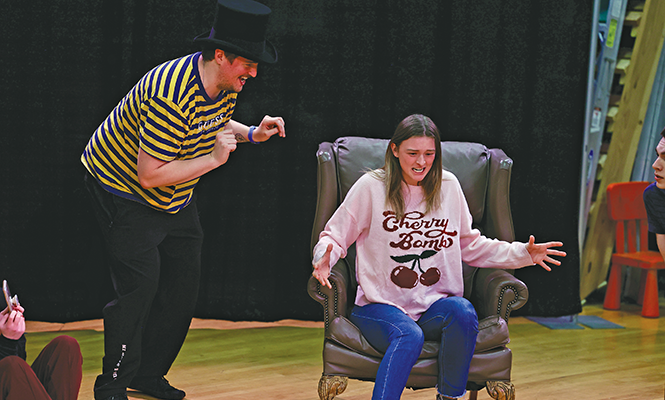University of Utah School of Music premiere of A.L.I.C.E.
Composer connects the Lewis Carroll story to her experience living with autism
By Scott Renshaw @scottrenshawFor those who are most familiar with Lewis Carroll's Alice in Wonderland from Disney movies, the story might seem to be all about fantastical absurdity. For composer Amy Scurria, who decided to turn the story into the opera A.L.I.C.E., it provides a unique connection to her real-world experience.
As an adult, Scurria was diagnosed with autism—but as she puts it, "I was born autistic, but spent most of my life not knowing. ... I didn't know how to approach the world. It all felt ridiculous to me. The world just didn't make sense to me; so many people didn't make sense to me."
She recalls being drawn to Lewis Carroll's Alice stories as a child, and later, upon joining online groups for adults with autism, realized that she was not alone among her autistic peers in feeling this affinity. "I'm still unpacking why," she says. "I was always so literal, and Alice is always so forthright and literal. ... If you put yourself in Alice's position, Wonderland is this odd and very dark experience. She keeps missing things and misunderstanding the characters, and they're misunderstanding her."
Still, when she began thinking about A.L.I.C.E. as a libretto for an opera, it wasn't immediately clear to her how to find the dramatic hook for the story that would work in that art form. She credits her husband and librettist, Zane Corriher, for helping to unlock that component. "We came to The Caterpillar's question of 'Who are you?'" she says. "Zane sort of focused on that; what if we make it about identity? Identity had become so important in my life, and in everyone's life; it's the most important journey you can take."
The development of A.L.I.C.E. has taken several years, including a festival version with a chamber orchestra. But for its first production with a full orchestra, A.L.I.C.E. will be coming to the University of Utah, directed by the university's Director of Opera, Robert Breault. Breault recalls encountering the work—and Scurria—for the first time at the 2023 conference of the National Opera Association in Houston, where Scurria had a table set up.
"I was running around because I'm also the official photographer for the convention," Breault says. "Every time I looked at Amy, I saw this person who was reaching out and wanted to talk. So I stopped, and was absolutely enamored with the project. ... I just felt an affinity for Amy herself, and working with her. You have to have that kind of connection with a human being, and think it's going to be rewarding to spend time with this person."
Yet Breault also acknowledges that there's a particular risk that goes into producing a brand-new work, for any arts organization. "If you bring in a bomb, and the students hate it, that's a lot of resources to spend on a project like that," he says. "In the arts, we have to be very nimble with how we use our resources. So I weighed that risk against the opportunity: to re-create, or to create."
That creation has involved ongoing collaboration between all parties involved, to the extent of bringing Scurria and Corriher into video chats during rehearsals. Breault says this provides a unique creative opportunity for the student artists that doesn't exist when working on classical operas. "The students can create their own unique takes on the characters," he says, "but with the guidance of the actual composer."
Scurria adds that the process has been just as satisfying for her. "As a composer, when you create, there's an aspect of yourself that goes into your work," she says. "I've been really lucky with this work, because I feel like so far, everyone that's grabbed onto it has seen it for what it is, and has seen me. Working with [Breault] has been very easy, and I do trust him completely. And he keeps checking in with me, and I don't think there's anything I've said no to yet."
That collaborative component is one that Scurria values tremendously, considering how personal the story of A.L.I.C.E. is to her, and how much she connects it to her own experience. While it might seem more obvious for someone to share such personal material in an artistic form that doesn't require the interpretation of other artists, Scurria thinks of it in a very different way, one that brings it back to wanting to be understood and heard.
"I got into writing music because I felt often like I couldn't communicate well enough with the world," Scurria says. "And I still feel that way. Finding my way into opera, having this be collaborative, is such a needed and powerful experience for me, because it's how I connect—having people who want to connect to me pouring my soul into the music, and they want to be part of that. It's healing for that little girl who'd stand on the playground and not know how to join in."
More by Scott Renshaw
-
Film Reviews: New Releases for April 26
Challengers, Boy Kills World, Humane, Alien 45th anniversary
- Apr 25, 2024
-
CHALLENGERS feature movie review
Zendaya centers a romantic triangle with a unique relationship spin
- Apr 24, 2024
-
Film Reviews: New Releases for April 19
The Ministry of Ungentlemanly Warfare, Abigail, The Beast, Hard Miles, Sasquatch Sunset and more
- Apr 19, 2024
- More »
Latest in Arts & Entertainment
Readers also liked…
-
New TV for January 2023
Mayfair Witches, Velma, The Last of Us, Poker Face and more premieres
- Jan 4, 2023




